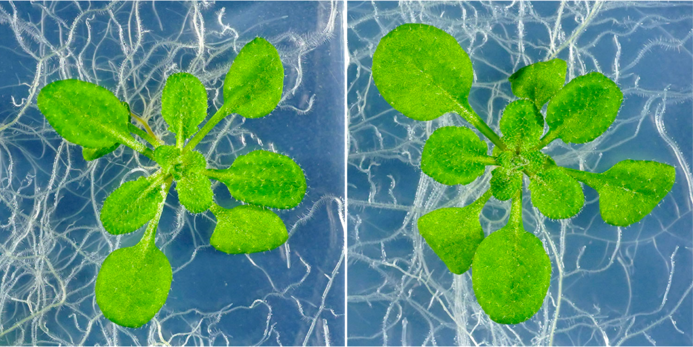Crops are frequently subjected to unfavorable growing conditions. Disease, severe temperatures, and saline soils, for example, cause plants to utilize energy to adapt to stress rather than for development. This is referred to as the “growth-stress response trade-off.”
 PSY receptor mutant (right) and wild type (left). PSY receptor mutant is less stress tolerant, but its growth is facilitated. Image Credit: Dr Yoshikatsu Matsubayashi
PSY receptor mutant (right) and wild type (left). PSY receptor mutant is less stress tolerant, but its growth is facilitated. Image Credit: Dr Yoshikatsu Matsubayashi
Nagoya University researchers have uncovered a previously unknown route that governs whether a plant spends its resources on growth or stress tolerance. This research might allow the stress response to be modulated in agricultural settings, thereby enhancing crop yields. The findings were reported in the journal Science.
Professor Yoshikatsu Matsubayashi and Assistant Professor Mari Ohnishi of Nagoya University’s Graduate School of Science explored the role of hormones and their receptors in plant stress response.
Researchers concentrated on three receptors for which no hormone had yet been discovered. They found the PSY family in thale cress (Arabidopsis thaliana), a little flowering plant, which serves as a hormone, attaching to these receptors and controlling the transition between the stress response and growth.
The researchers found an unexpected finding after looking at the key pathway. Typically, hormones and receptors operate like locks and keys, with the hormone (in this example, a peptide PSY hormone) functioning as the key required to initiate a biological process.
However, in this work, PSY-negative plant cells nonetheless exhibited a robust stress response. This implies that rather than turning on the stress response, the PSY “key” in the receptor “lock” maintains it turned off.
The scientists cultivated plants under very stressful circumstances using heat, salt, and bacteria to explore the nature of stress responses. Plants that were either PSY receptor lacking or were continually given PSY failed to respond appropriately to stress, resulting in decreased survival. The researchers determined that stressed plants quit producing PSY, the absence of which causes stress response genes to be activated.
The researchers developed a method to explain this behavior in which injured cells diminish the concentration of PSY hormones in the cell layers next to the damaged areas. The stress reaction is triggered by a shortage of PSY. This might explain why even damaged plants can convey messages.
An impaired plant cell might also halt the production of the PSY hormone, initiating the stress response, rather than spending its limited resources to develop a new signal. A system of this type would balance stress tolerance with related energy expenditures. As a consequence, plants may grow even under the most adverse environmental conditions by managing their limited resources.
Most of the mechanisms found in Arabidopsis are found in other plants. Therefore, our results apply to all crops. This mechanism makes it possible to artificially control the balance between stress tolerance and yield, which is a trade-off relationship. In recent years, an increasing number of crop plants have been grown in plant factories.”
Yoshikatsu Matsubayashi, Professor, Graduate School of Science, Nagoya University
Matsubayashi adds, “When crops are grown indoors, it is a low-stress environment and the stress response system that is needed to withstand the fluctuating natural outdoor environment is not always necessary. Generating cultivars with reduced PSY receptor activity in plant factories may lead to higher yields in these controlled environments.”
Source:
Journal reference:
Ogawa-Ohnishi, M., et al. (2022) Peptide ligand-mediated trade-off between plant growth and stress response. Science. doi.org/10.1126/science.abq5735.